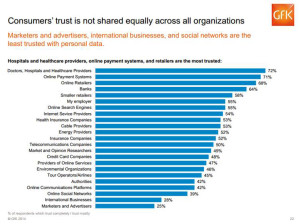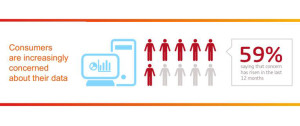 Ever since the Enron scandal and then the advent of the Great Recession of 2008, U.S. consumers began to lose faith in institutions: employers, government agencies, companies. The growth of hospital and health insurance privacy breaches in may drive consumers to distrust one industry segment in which their faith hasn’t yet dramatically eroded: health care.
Ever since the Enron scandal and then the advent of the Great Recession of 2008, U.S. consumers began to lose faith in institutions: employers, government agencies, companies. The growth of hospital and health insurance privacy breaches in may drive consumers to distrust one industry segment in which their faith hasn’t yet dramatically eroded: health care.
A consumer survey on privacy from pollster GfK and a paper on Big Data issued by The White House, point to U.S. citizens growing more protective of their personal information.
The first chart, based on the GfK survey data, illustrates that doctors, hospitals and health providers are the #1 trusted industry when it comes to handling personal data.
Least trusted? Marketers and advertisers, international businesses, online social networks and communications platforms, and “authorities” — shorthand for “government agencies” in GfK-speak.
 But most consumers are increasingly worried about their data, as the second chart shows.
But most consumers are increasingly worried about their data, as the second chart shows.
Concerns about data privacy cross all age groups: nearly one-half of Gen X and Gen Y consumers are “very worried” about the protection of their personal data, GfK learned. Furthermore, one-third of consumers have been personally affected by the misuse of personal data in the past year, and 60% of consumers told GfK their data privacy concerns have increased in the past twelve months. As a result, some consumers avoid using online services altogether: 10% stay away from online games, 8% from online shopping, 8% from online services and maps, and 7% from using email services.
8 in 10 people in the U.S. are looking to the government to develop and enforce stricter guidelines on third parties “repurposing” personal data, a concern that crosses generations from young Gen Z’s to Pre-Boomers.
The White House’s paper, Big Data: Seizing Opportunities, Preserving Values, provides a balanced argument for the “good use” of personal data, with eyes wide-open on the hazards of third party use of data for discrimination: “red-lining” consumers living in particular zip codes, or rejecting peoples’ employment applications due to a particular “score” they might achieve based on a less-than-transparent algorithm.
In health, the paper speaks about the opportunities for Big Data to mash with user-generated data for public health – to predict and manage epidemics, for example, or to provide people with self-help for managing chronic diseases like asthma and diabetes.
Health Populi’s Hot Points: In health care, data sharing is critical for driving research for cures to diseases and public health management (say, for emerging epidemics), as well as for providing just-in-time support for patients managing chronic conditions or preventing the onset of illness in the first place.
For health, it’s increasingly recognized that while you are what you eat, you are “where you live,” as well based on this Robert Wood Johnson analysis. Without full transparency in terms of the health system’s and other third parties’ use of each of our personal health data, trust between health citizens (the Health Populi) and the health system will further erode.
As the CEO of Target, the retailer that experienced a huge data breach over the 2013 holiday season, resigns, and the fallout from Edward Snowden’s revelations continues to be debated, more U.S. consumers are aware of the risks of their data in internet clouds, in electronic health records, stored with fitness and health app companies, and generated through retail spending.
FastCo Exist published a column called 3 Ways Big Data Is Going to Be Used Against You in the Future on May 6, 2014. The 3 ways described are job discrimination, criminal discrimination, and consumer discrimination. Stay tuned for my next paper soon to be published by California HealthCare Foundation on your user-generated data and health opportunities and challenged. We can add health discrimination — and health-help — to the list of benefits and the “dark side” of health data.




 I'm in amazing company here with other #digitalhealth innovators, thinkers and doers. Thank you to Cristian Cortez Fernandez and Zallud for this recognition; I'm grateful.
I'm in amazing company here with other #digitalhealth innovators, thinkers and doers. Thank you to Cristian Cortez Fernandez and Zallud for this recognition; I'm grateful. Jane was named as a member of the AHIP 2024 Advisory Board, joining some valued colleagues to prepare for the challenges and opportunities facing health plans, systems, and other industry stakeholders.
Jane was named as a member of the AHIP 2024 Advisory Board, joining some valued colleagues to prepare for the challenges and opportunities facing health plans, systems, and other industry stakeholders.  Join Jane at AHIP's annual meeting in Las Vegas: I'll be speaking, moderating a panel, and providing thought leadership on health consumers and bolstering equity, empowerment, and self-care.
Join Jane at AHIP's annual meeting in Las Vegas: I'll be speaking, moderating a panel, and providing thought leadership on health consumers and bolstering equity, empowerment, and self-care.